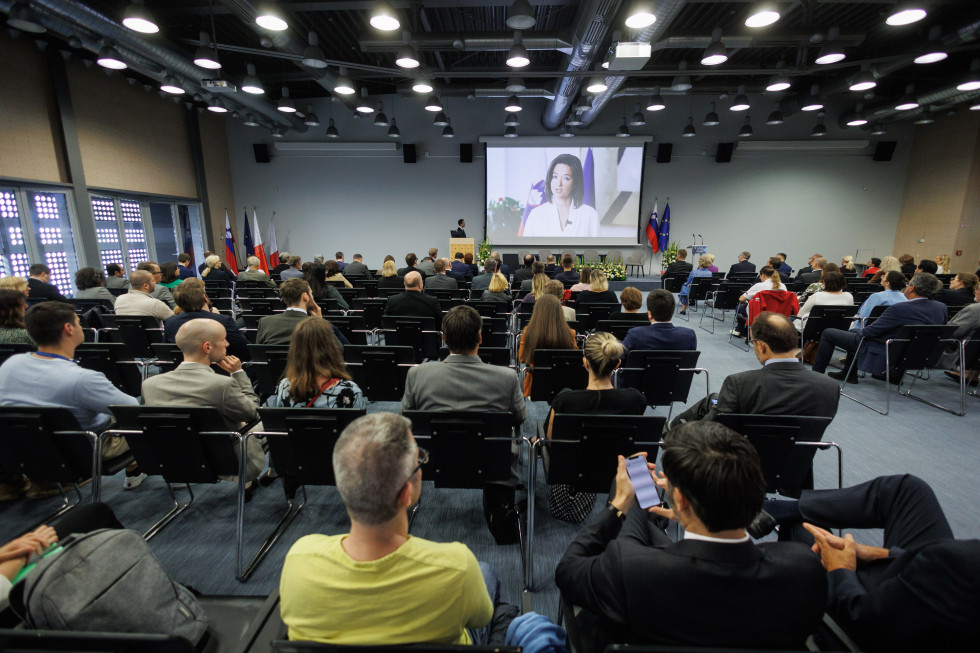Strengthening the Protection of Civilians: The Challenges of Modern Armed Conflicts

Video address by Minister Tanja Fajon | Author STA/Nebojša Tejić
In her opening address at the event entitled “Strengthening the Protection of Civilians: The Challenges of Contemporary Armed Conflicts”, President of the Republic of Slovenia Nataša Pirc Musar noted that the number of wars around the world, and thus the number of civilian casualties, is skyrocketing, and that we are facing the highest number of armed conflicts since the Second World War. She cited the wars in Ukraine and Gaza, as well as the many internal conflicts claiming thousands of civilian lives every day, forcibly displacing millions and causing indescribable destruction. “This has to stop. This should be our minimum moral imperative. The perpetrators who feast on other people’s lives have to be brought to justice. The question at hand is how we could use international humanitarian law and human rights law to assist in the advocacy of peace and humanity. How to provide better protection for civilians in contemporary complex and recurring armed conflicts? How to end impunity for aggression, genocide, war crimes and crimes against humanity?” She added that for Slovenia as a non-permanent member of the UN Security Council, these questions and the search for solutions are of paramount importance, and that Slovenian diplomats around the world are working tirelessly to address these sad stories. “In my international travels, I have observed that the role of Slovenia as a defender of international law, especially humanitarian and human rights law, is a constructive and respected one,” she said.
In her video address, Minister Fajon stressed the importance of respecting the Geneva Conventions and international law: “Civilians, especially children and women, are the most numerous and tragic victims of modern urbanised armed conflict. They lack access to basic services such as water, sanitation and health care due to damaged infrastructure. The obstruction of humanitarian aid leads to malnutrition and hunger. Today, too many children are victims of crime and too many are orphaned. All this is causing severe psychological trauma and a shattered childhood.” She added that the disregard for laws and conventions is unacceptable: “Such violations of international humanitarian law must stop immediately. The law must be fully respected on the ground. Failure to do so is a collective abandonment of humanity and a departure from the principles enshrined in the Charter of the United Nations.”
Another speaker at the event was Minister of Defence Marjan Šarec, who said: “The constant efforts to protect civilians are reflected in advocacy, operational measures, military operations, exercises and training programmes of various international bodies, non-governmental organisations and armed forces, including the Slovenian Armed Forces, which aim to ensure respect for international humanitarian law.” He also recalled that the role of armed forces in the protection of civilians during armed conflict is multifaceted and crucial: “Armed forces, as the principal representatives of the State, are responsible for respecting and ensuring the protection of civilians in accordance with the principles of law. This includes the obligation to distinguish between combatants and non-combatants and proactive measures such as safe zones, evacuation, humanitarian assistance, as well as military procedures and training to respect the rule of law.”
The two-day event (11–12 June) hosted by the Faculty of Social Sciences in Ljubljana is attended by more than 150 participants, including representatives of international organisations, the International Committee of the Red Cross, national committees for international humanitarian law, diplomats, legal advisers from the foreign ministries of EU Member States and students. The high-level debate focused on the relevance of the Geneva Conventions and the Hague Convention for the Protection of Cultural Property in today's complex, recurrent and urbanised armed conflicts. The second panel on the first day discussed the protection of civilians and cultural heritage in besieged cities.
On Wednesday 12 June, the programme will begin at 9 a.m. and will cover cyber-attacks, the protection of civilians from misinformation, disinformation and hate speech in armed conflict. The final panel will address ensuring accountability for violations of international humanitarian law.

